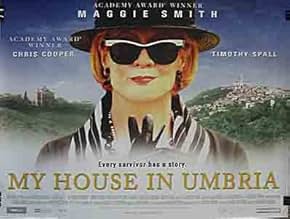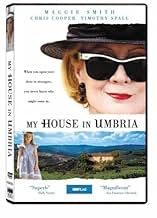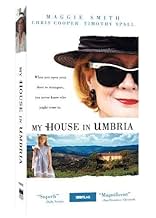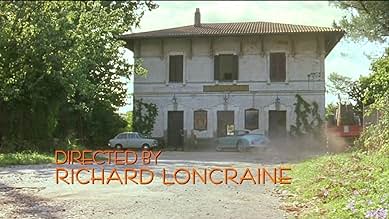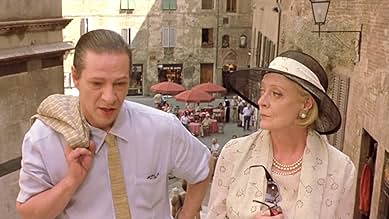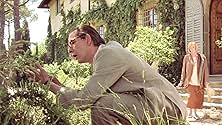IMDb रेटिंग
6.9/10
3.8 हज़ार
आपकी रेटिंग
अपनी भाषा में प्लॉट जोड़ेंAn unlikely group of people find solace and friendship after being thrown together in the wake of a terrorist attack.An unlikely group of people find solace and friendship after being thrown together in the wake of a terrorist attack.An unlikely group of people find solace and friendship after being thrown together in the wake of a terrorist attack.
- 1 प्राइमटाइम एमी जीते
- 4 जीत और कुल 27 नामांकन
Alison Cameron Adam
- General's Daughter
- (as Alison Adam)
Vittoria Colonna
- Young Woman
- (as Vittoria Colonna Di Stigliano)
फ़ीचर्ड समीक्षाएं
Sometimes it is good not to know much about a movie before watching it, so you won't have any prejudices. And it is sometimes even good to have wrong idea about what you're going to see, because you can be pleasantly surprised.
My House in Umbria sounded as it was happening on the beginning of 20th century, either in castle full of aristocrats (like Age of Innocence) or in deserted house with poor artists having no money to leave (Stealing Beauty; Sirens). Room with a View or Under Tuscan Sun came in mind too.
The train in first few minutes was obviously not a century old one. Characters were more likely to fit in Miss Marple story. And that was just a beginning of surprises.
A warm story about so different people that can successfully create a small community (instant family) is so hard to find. Unusual communities are usually shown as unstable group and intense interpersonal relations build the dynamic of group which develops the plot. (Tillsammans, Black Moon, Hair as an example.) But it is developing harmony that we see in House in Umbria, people who learn to lean on each other and help each other in the same time. Almost like an ideal early Christian community. Though religion isn't a topic of the movie, there are more Christian feelings here than in many religious movies. From loving and helping to forgiving. When one of the main characters appears to be the one guilty for all the tragedies that happened to the group, he isn't shown as a villain but rather a seduced man, a poor victim of circumstances.
The only person who is rather odd and doesn't fit is the only one that enters the movie after first five minutes (when we meet all other characters): another surprise - in an American (HBO!) movie the only person we dislike is the only (adult) American character in the movie (played incredible effectively by Chris Cooper as a superb contrast in cast). The interaction between him and the group is the only real conflict we see, and during that time our feelings towards him change. Finally we learn to accept him the way he is (as we should accept all people, says another message of the movie), because he is just that kind of man. He is not evil, he is just different. And, maybe as the only influence he was able to let himself implement, he makes an unexpected choice at the end, realizing that though this community is strange and odious to him, it's not necessary worthless, and it might be wrong forcing someone to replace this warmth and caring love with his scientifically precise but cold, emotionless world.
Something, however, didn't change from the beginning: Maggie Smith is still so Ms Marpleish that I was expecting at least one small murder which she could solve. And all people living in House in Umbria might have been imagined by Agatha Christie, actors (Barker, Spall, Dazzy, Cooper) ideal for Poirot's suspects and even Giannini as inspector could pass well as inspector Japp.
But at the end I didn't mind lack of murder. It was one of those rare TV movies that can be recommended to anyone who prefers emotions and peace instead of action and violence. It is not a soap opera, it is not cheesy; and don't let my words make you understand it is a religious movie: it is humanity in the first place that House in Umbria promotes.
My House in Umbria sounded as it was happening on the beginning of 20th century, either in castle full of aristocrats (like Age of Innocence) or in deserted house with poor artists having no money to leave (Stealing Beauty; Sirens). Room with a View or Under Tuscan Sun came in mind too.
The train in first few minutes was obviously not a century old one. Characters were more likely to fit in Miss Marple story. And that was just a beginning of surprises.
A warm story about so different people that can successfully create a small community (instant family) is so hard to find. Unusual communities are usually shown as unstable group and intense interpersonal relations build the dynamic of group which develops the plot. (Tillsammans, Black Moon, Hair as an example.) But it is developing harmony that we see in House in Umbria, people who learn to lean on each other and help each other in the same time. Almost like an ideal early Christian community. Though religion isn't a topic of the movie, there are more Christian feelings here than in many religious movies. From loving and helping to forgiving. When one of the main characters appears to be the one guilty for all the tragedies that happened to the group, he isn't shown as a villain but rather a seduced man, a poor victim of circumstances.
The only person who is rather odd and doesn't fit is the only one that enters the movie after first five minutes (when we meet all other characters): another surprise - in an American (HBO!) movie the only person we dislike is the only (adult) American character in the movie (played incredible effectively by Chris Cooper as a superb contrast in cast). The interaction between him and the group is the only real conflict we see, and during that time our feelings towards him change. Finally we learn to accept him the way he is (as we should accept all people, says another message of the movie), because he is just that kind of man. He is not evil, he is just different. And, maybe as the only influence he was able to let himself implement, he makes an unexpected choice at the end, realizing that though this community is strange and odious to him, it's not necessary worthless, and it might be wrong forcing someone to replace this warmth and caring love with his scientifically precise but cold, emotionless world.
Something, however, didn't change from the beginning: Maggie Smith is still so Ms Marpleish that I was expecting at least one small murder which she could solve. And all people living in House in Umbria might have been imagined by Agatha Christie, actors (Barker, Spall, Dazzy, Cooper) ideal for Poirot's suspects and even Giannini as inspector could pass well as inspector Japp.
But at the end I didn't mind lack of murder. It was one of those rare TV movies that can be recommended to anyone who prefers emotions and peace instead of action and violence. It is not a soap opera, it is not cheesy; and don't let my words make you understand it is a religious movie: it is humanity in the first place that House in Umbria promotes.
A tragedy leaves five people scarred. To heal, one of the survivors invites the others to her home in the Umbrian hills. As she says, to let the beauty of Umbria be a healing balm.
Umbria is one of the stars of the film, yet with a deft hand the director and cinematographer weave its physical beauty to complement the unfolding drama of the film.
Maggie Smith delivers a stunning performance. Her character is a flawed woman who escapes into an alcoholic haze and dreamweaving to explore her soul and the souls of those around her. Ever curious, she delves into places she should not, but always with kind and good intentions.
Chris Cooper plays a persnickety scientist with understated excellence. His facial expressions are magnificent, his words economical, his performance strong.
Ronnie Barker plays a retired English military with aplomb. Beno Furmann delivers a low-key performance, his eyes and his face reflecting guilt and pain. Timothy Spall plays an Irishman with a rare sweetness. A young American girl, Emmy Clarke, plays the film's lynchpin, Aimee, with simple perfection. And Giancarlo Giannini adds a deft touch.
This is a delightful film. There is no glitz, no whiz-bang action. It is a study of the human soul, of the human capacity to deal with pain, to cope, and to survive. The acting ranges from the good to the wonderful, and it is a fabulous example of film-making.
Umbria is one of the stars of the film, yet with a deft hand the director and cinematographer weave its physical beauty to complement the unfolding drama of the film.
Maggie Smith delivers a stunning performance. Her character is a flawed woman who escapes into an alcoholic haze and dreamweaving to explore her soul and the souls of those around her. Ever curious, she delves into places she should not, but always with kind and good intentions.
Chris Cooper plays a persnickety scientist with understated excellence. His facial expressions are magnificent, his words economical, his performance strong.
Ronnie Barker plays a retired English military with aplomb. Beno Furmann delivers a low-key performance, his eyes and his face reflecting guilt and pain. Timothy Spall plays an Irishman with a rare sweetness. A young American girl, Emmy Clarke, plays the film's lynchpin, Aimee, with simple perfection. And Giancarlo Giannini adds a deft touch.
This is a delightful film. There is no glitz, no whiz-bang action. It is a study of the human soul, of the human capacity to deal with pain, to cope, and to survive. The acting ranges from the good to the wonderful, and it is a fabulous example of film-making.
The HBO TV movie "My House in Umbria" should be seen primarily for the complex and layered performance of divine Maggie Smith. As romance novelist Emily Delahunty, she projects an image of refinement and elegance that conceals a deeper, darker self. That self is revealed slowly, and we find hidden within a character that is not only at variance with Miss Delahunty's adopted persona, but also very different from the prim and proper ladies Maggie Smith habitually plays on the silver screen. We see that Miss Smith is capable even of being seductive and slatternly, most unlike her many repressed and spinsterish roles.
Maggie Smith has the kind of mesmerizing voice and marvelous diction that would enable her to entertain film audiences by reading the proverbial telephone book. I am reminded of Glenda Jackson's (virtual) one-woman show in "Stevie" and Joanne Woodward's voice-over of "The Age of Innocence".
The rest of the characters in "My House in Umbria" are, alas, a motley crew, sketched in only very lightly, merely second bananas to Maggie Smith's central figure. The time of the story is difficult to pin down based on the clothes and motor cars, but one imagines it takes place during the 1970s, the era of the Bader-Meinhof gang in Germany and the Red Brigades in Italy. The denouement is a little too pat, but the journey is still well worth our while.
One of the key questions raised in the film is what anger would drive a human being to commit an act of terror. But it becomes quickly apparent that political terrorism is not the only kind of "man's inhumanity to man" that is intended here. The focus is, rather, on innocence shattered and destroyed, the cruelty visited by individuals upon each other, the sense of guilt that it engenders, and the possibility of forgiveness and redemption that always, always exists if we "seize the day" and allow ourselves to be happy.
Maggie Smith has the kind of mesmerizing voice and marvelous diction that would enable her to entertain film audiences by reading the proverbial telephone book. I am reminded of Glenda Jackson's (virtual) one-woman show in "Stevie" and Joanne Woodward's voice-over of "The Age of Innocence".
The rest of the characters in "My House in Umbria" are, alas, a motley crew, sketched in only very lightly, merely second bananas to Maggie Smith's central figure. The time of the story is difficult to pin down based on the clothes and motor cars, but one imagines it takes place during the 1970s, the era of the Bader-Meinhof gang in Germany and the Red Brigades in Italy. The denouement is a little too pat, but the journey is still well worth our while.
One of the key questions raised in the film is what anger would drive a human being to commit an act of terror. But it becomes quickly apparent that political terrorism is not the only kind of "man's inhumanity to man" that is intended here. The focus is, rather, on innocence shattered and destroyed, the cruelty visited by individuals upon each other, the sense of guilt that it engenders, and the possibility of forgiveness and redemption that always, always exists if we "seize the day" and allow ourselves to be happy.
I reserve 10 out of ten for "Tea With Mussolini". Dame Maggie gives another outstanding performance as a writer who encounters a bomb on a train. It was a way to introduce the 4 main characters (not including the fabulous Quinty) who we come to love. The clever voice overs weave a beautiful thread (by Maggie of course) tieing together a story of mutual care and affection. Mrs Delahunty loves a drink or 15 and her hospitality extends to anyone within her reach. Has she become a lonely old lady who just wants company in her secluded villa? Does it really matter that there may be a dark secret amongst her guests? No! The outside dinner scene the night before the girl Aimee was due to leave was stunning. I so hoped she wouldn't go and that the "family" would stay together........
I'd wath this again and again and will add it to my extensive collection. GO DAME MAGGIE!
I'd wath this again and again and will add it to my extensive collection. GO DAME MAGGIE!
The movie was wonderful. 'My House in Umbria' was like a fresh breath of Italian countryside air, or taking a bite into a delicious pie in a terrace in Italy. The sites were breathtaking, even if they were seen from my television. The story was understandable and intriguing. The characters were fun. Mrs. Delahunty, a romantic novelist, with her numerous names and vibrant personality; i found myself wanting to be like her - minus the excessive drinking and smoking. There were also the many friends she had made on a train which had been in an accident. These strangers put together in Mrs.Delahunty's villa. Werner, the general, and Aimee (a young face who was very captivating on screen), and Quinty. All these characters truly made the film. BUT the only stain in the wonderful fabric that is this movie was Chris Cooper's character, Mr. Tom River-something. I found him rather pompus but a necessary element in the movie. I can't find more words to describe the movie. The scenes of Italian cities and towns were wonderful. oh, and mrs.delahunty's thoughts were well illustrated on screen. All in all i truly liked the movie. I think this movie will delight many people.
क्या आपको पता है
- ट्रिवियाMrs. Emily Delahunty's (Dame Maggie Smith's) car is an Alfa Romeo 6C-2500, produced between 1947 and 1953. It is a five-seat touring car popular with affluent post-war customers interested in a sporty yet comfortable vehicle.
- भाव
Mrs. Emily Delahunty: In the garden, delphiniums were in flower. Through scented twilight, the girl in the white dress walked with a step as light as a morning cobweb. That evening she hadn't a care in the world.
टॉप पसंद
रेटिंग देने के लिए साइन-इन करें और वैयक्तिकृत सुझावों के लिए वॉचलिस्ट करें
विवरण
- रिलीज़ की तारीख़
- कंट्री ऑफ़ ओरिजिन
- आधिकारिक साइट
- भाषाएं
- इस रूप में भी जाना जाता है
- Mitt hus i Umbrien
- फ़िल्माने की जगहें
- उत्पादन कंपनियां
- IMDbPro पर और कंपनी क्रेडिट देखें
बॉक्स ऑफ़िस
- दुनिया भर में सकल
- $13,24,900
- चलने की अवधि1 घंटा 43 मिनट
- रंग
- ध्वनि मिश्रण
- पक्ष अनुपात
- 1.85 : 1
इस पेज में योगदान दें
किसी बदलाव का सुझाव दें या अनुपलब्ध कॉन्टेंट जोड़ें


